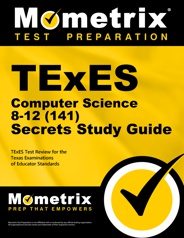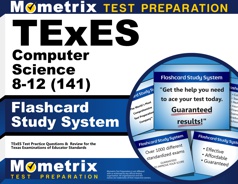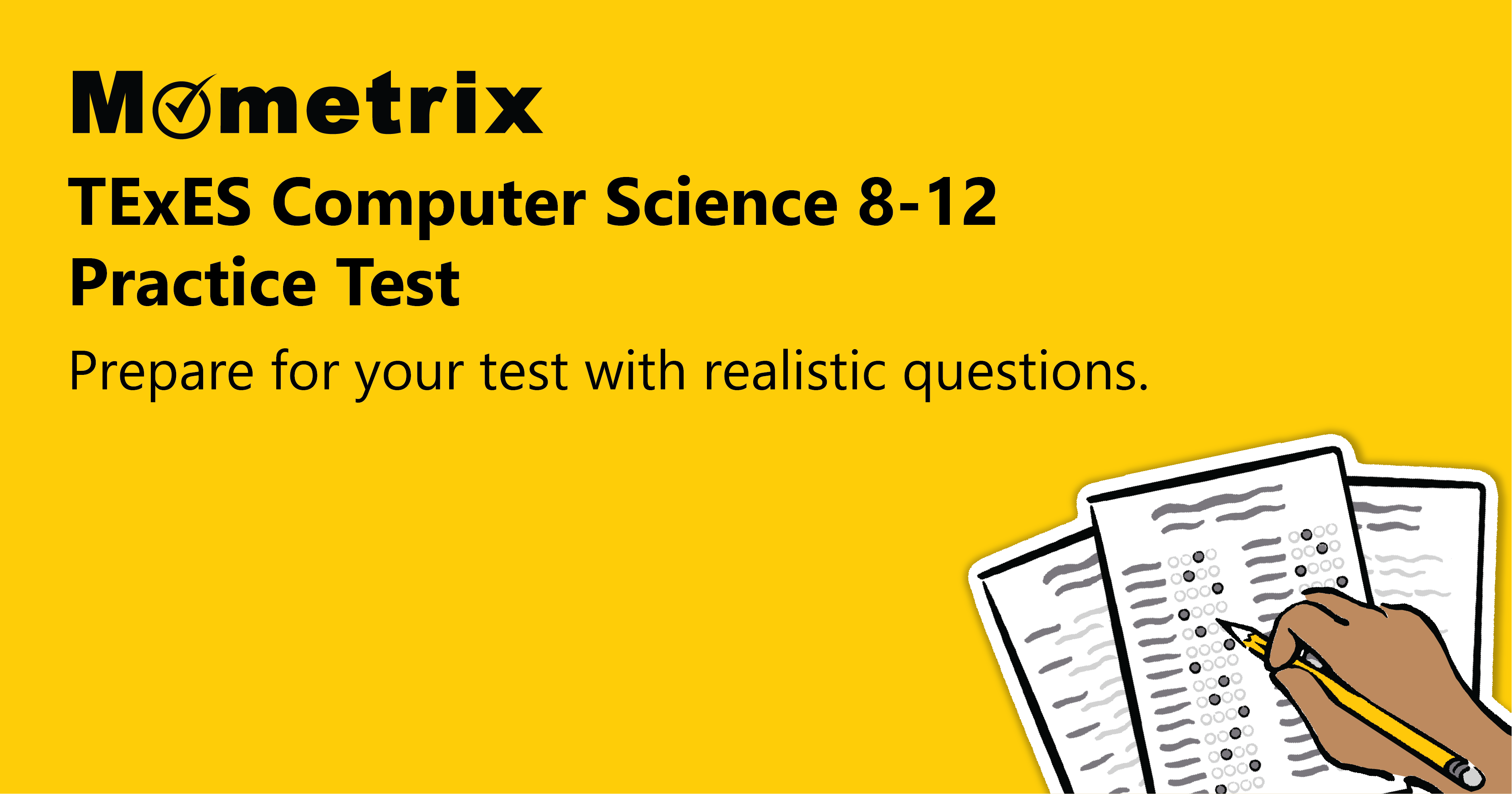The TExES Computer Science 8-12 exam is an assessment test designed to test the knowledge of entry-level computer science teachers in the state of Texas.
Click “Start Test” above to take a free TExES Computer Science 8-12 practice test, and check out our premium-quality TExES test prep resources by clicking the links below!
TExES Computer Science 8-12 Exam Outline
The TExES Computer Science 8-12 exam contains a total of 100 selected-response questions, and you will be given 4 hours and 45 minutes to complete it.
Teaching Standards
The exam is aligned with 11 standards for educators that have been outlined by the State Board for Educator Certification.
Click the button below to see the full list of approved educator standards:
Approved Educator Standards
Standard I: You are expected to promote creative thinking and innovative processes to construct knowledge, generate new ideas, and create products.
Standard II: You are expected to collaborate and communicate both locally and globally using digital tools and resources to reinforce and promote learning.
Standard III: You are expected to acquire, analyze, and manage content from digital resources.
Standard IV: You are expected to make informed decisions by applying critical-thinking and problem-solving skills.
Standard V: You are expected to practice and promote safe, responsible, legal, and ethical behavior while using technology tools and resources.
Standard VI: You are expected to demonstrate a thorough understanding of technology concepts, systems, and operations.
Standard VII: You are expected to know how to plan, organize, deliver, and evaluate instruction for all students that incorporates the effective use of current technology.
Standard VIII: You are expected to teach computer-science-related creativity and innovation; communication and collaboration; research and information fluency; critical thinking, problem solving, and decision-making; digital citizenship; and technology operations and concepts strands.
Standard IX: You are expected to teach digital-forensics-related creativity and innovation; communication and collaboration; research and information fluency; critical thinking, problem solving, and decision-making; digital citizenship; and technology operations and concepts strands.
Standard X: You are expected to teach robotics-related creativity and innovation; communication and collaboration; research and information fluency; critical thinking, problem solving, and decision-making; digital citizenship; and technology operations and concepts strands.
Standard XI: You are expected to teach game-development-related creativity and innovation; communication and collaboration; research and information fluency; critical thinking, problem solving, and decision-making; digital citizenship; and technology operations and concepts strands.
Exam Domains
The exam is split into four domains, each of which covers one or more of the standards mentioned above.
| Domain | Percentage of Exam | Standards Used |
|---|---|---|
| 1. Technology Applications Core | 12.5% | I-VII |
| 2. Program Design and Development | 35% | VIII |
| 3. Programming Language Topics | 40% | VIII |
| 4. Specialized Topics | 12.5% | VIII-XI |
For the questions in this domain, you will be asked to demonstrate your knowledge of the following:
- Technology terminology and concepts
- Appropriate uses of digital files, hardware, and software
- Acquiring, analyzing, and evaluating digital information
- Using technology tools to solve problems, evaluate results, and communicate information in a variety of formats
- Planning, organizing, delivering, and evaluating instruction that effectively utilizes current technology
2. Program Design and Development (35%)
For the questions in this domain, you will be asked to demonstrate your knowledge of the following:
- Problem-solving strategies
- Different procedures for program design
- Procedures for software development and implementation
- Computer science terminology and concepts
- Characteristics of different programming languages and paradigms
3. Programming Language Topics (40%)
For the questions in this domain, you will be asked to demonstrate your knowledge of the following:
- Efficiently and correctly using data types, data structures, and functions when developing code
- Efficiently and correctly using statements and control structures when developing code
- Constructing, comparing, and analyzing various algorithms
4. Specialized Topics (12.5%)
For the questions in this domain, you will be asked to demonstrate your knowledge of the following:
- Discrete mathematics relevant to computer science
- Digital forensics
- Robotics
- Game and mobile application development
Check out Mometrix's Study Guide
Get practice questions, video tutorials, and detailed study lessons
Get Your Study Guide
Exam Registration
To register for the TExES Computer Science 8-12 exam, you must create an online NES account via their website. Once your account has been created, you can use it to register for the exam and schedule an exam date. When you register, you will need to pay the $116 examination fee.
Test Day
On exam day, you should arrive at the testing center about 30 minutes early on the day of your testing appointment to allow time for the check-in process. Upon arrival, you will be asked to sign in and provide at least one form of valid photo ID.
After the check-in process is complete, you will be asked to leave all personal items (cell phone, watch, wallet, keys, accessories, etc.) in a locker outside the testing area.
Once you enter the testing room, you will be given a brief tutorial on the testing system before the exam begins.
How the Exam is Scored
The TExES Computer Science 8-12 exam is scored on a scale of 100-300.
To pass the exam, your final scaled score must be 240 or higher.
Check out Mometrix's Flashcards
Get complex subjects broken down into easily understandable concepts
Get Your Flashcards
FAQs
Q
How many questions are on the TExES Computer Science 8-12 exam?
A
There are 100 selected-response questions on the exam.
Q
How long is the TExES Computer Science 8-12 exam?
A
The time limit for the exam is 4 hours and 45 minutes.
Q
What is the passing score for the TExES Computer Science 8-12 exam?
A
To pass the exam, you must achieve a minimum scaled score of 240.
Q
How much does the TExES Computer Science 8-12 exam cost?
A
The examination fee is $116.
Mometrix Test Preparation is not affiliated with or endorsed by any official testing organization. All organizational and test names are trademarks of their respective owners.


